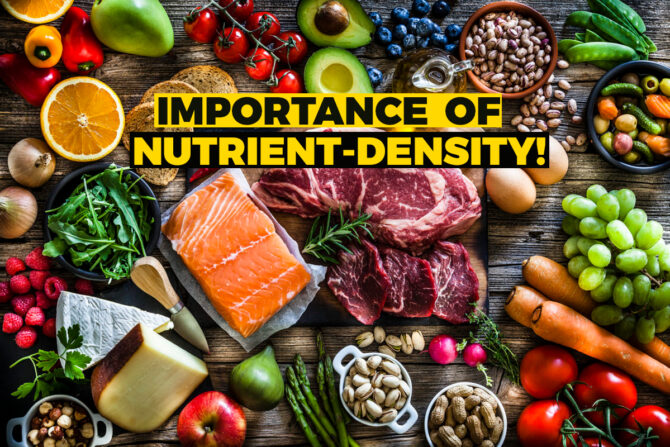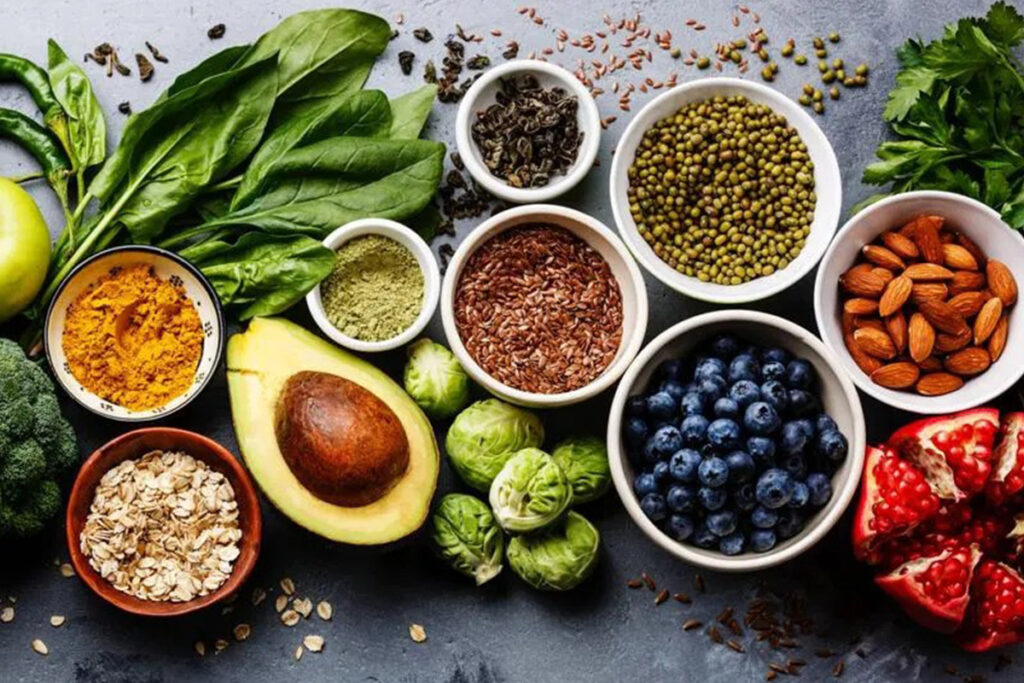
Why is it Important to Eat Nutrient-Dense Food?
As we get older, eating nutritious, healthy food becomes even more important since it powers our bodies, muscles, and minds. Remarkably, scientists have found that the typical diet is deficient in important vitamins, minerals, and antioxidants that are essential for maintaining optimal health and appearance. In fact, over 90% of us don’t get enough vitamin D, E, and other critical nutrients from our diet alone. Let’s examine how consuming foods high in nutrients can help you live your best life and address this issue. In this blog post, we’ll examine the particular factors behind the need to put these nutritious foods first, along with helpful hints for including them in our regular diets.
What is meant by Nutrient-Density?
Nutrient-dense foods are those that provide a high concentration of essential nutrients relative to the number of calories they contain. These nutrients include vitamins, minerals, essential fatty acids, protein, and fiber. Foods with different nutritional compositions can exist even within the same food group. For instance, wholegrain varieties of rice, pasta, and bread tend to have more fibre, vitamin, and mineral contents than refined forms.
There are two kinds of nutrients: macronutrients and micronutrients. The macronutrients are fat, protein, and carbohydrate. Macronutrients are necessary for our bodies in vast quantities since they give us energy. The body requires micronutrients, such as vitamins and minerals, in smaller quantities for normal functions. Vitamins are essential for the synthesis of energy, the immune system, blood clotting, and other processes. In the meantime, minerals are crucial for bone health, development, circulation, and a number of other functions.
Understanding Basic Essential Nutrients in Detail
There are six essential basic nutrients that are crucial to sustaining life on Earth. These are water, carbohydrates, fats, protein, vitamins, and minerals.

Water
Perhaps the most vital nutrient that humans require is water. It takes a few days for a person to go without water. Dehydration, even in mild cases, can lead to headaches and poor physical and mental performance. The human body is made of water. Every body cell requires water for its normal functioning. Water helps to maintain several key functions in our lives, such as:
- dehydration
- transporting other nutrients
- absorption of shocks
- eliminating pathogens
- lubrication
Water from the taps or bottles is the best source of natural, pure water. People who dislike the taste of ordinary water can add other citrus fruits or a pinch of lemon.
Carbohydrates
The body needs carbohydrates for proper function. All of the body’s cells and tissues need these sugars and starches as a source of energy. Carbohydrates exist in two different forms: simple and complicated. Rice, pasta, and white bread are examples of simple carbs that people ought to have in moderation. However, the following functions of the organism are supported by complex carbs:
- the defence mechanism
- digestion process
- energy required for tasks
Fats
Fat is an essential nutrient necessary for health. A person requires a particular amount of fat in order to keep their health at its peak. The body requires fats for various purposes, including energy and proper function. However, it’s crucial to prioritise the intake of healthy fats, such as polyunsaturated and monounsaturated fats, while minimising the consumption of trans and saturated fats. Healthy fats are required for the following functions:
- development of cells
- the nervous system
- absorption of vitamins and minerals
- the synthesis of hormones
- lowering the danger of heart disease
Healthy fats, which are present in nuts, seeds, avocados, and fatty fish, may boost general health and help maintain a diet that is balanced.
Proteins
Protein is an essential macronutrient required for a range of functions. Every body cell requires protein for its normal functions. Protein performs a range of functions, including:
- promoting the growth and formation of muscle, bone, skin, and hair
- supply tissues and cells with energy
- producing hormones, antibodies, and other vital chemicals
Protein can be taken by people through their meals. People can meet their protein requirements from both animal sources, i.e., meat, seafood, eggs, and plant sources like legumes, nuts and seeds, grains, and some vegetables.
Vitamins
Vitamins are crucial micronutrients required for several important functions. Vitamins can be divided into two primary types: water-soluble vitamins (C and B) and fat-soluble vitamins (A, D, E, and K). The body requires small amounts of vitamins in order to function optimally. Vitamins are required for:
- bolstering the bones and teeth
- Keeping your skin healthy
- enhancing cardiovascular health
- boosting the immune system
A diet high in fruits, vegetables, and lean proteins will supply all the vitamins needed in meals. To reduce or avert a deficit, people with digestive issues and those who consume fewer fruits and vegetables may need to take a vitamin supplement.
Minerals
Minerals are another type of micronutrient. The body needs very small amounts of minerals, which are important for a variety of bodily functions. Minerals are classified into two primary groups according to the quantity that the body needs. Major minerals are magnesium, calcium, sodium, chloride, phosphorus, and sulfur. The three minerals are iron, selenium, zinc, manganese, chromium, copper, iodine, and fluoride. These nutrients are required for the following important functions:
- regulate the water levels
- strengthen your bones
- Keeping your teeth healthy
- promoting blood pressure health
- supporting the transport of oxygen
You can make sure you get sufficient minerals by including dairy products (yoghurt, cheese), leafy green vegetables, spinach, seafood (like snails and shellfish), and meat in your daily diet.
Which Foods are Nutrient-Dense?
Foods high in vitamins, minerals, and other health-promoting nutrients with low levels of added sugars, saturated fats, and sodium are referred to as nutrient-dense foods. Nutrient-dense foods can include lean meats and poultry that have been prepared with little to no added sugar, saturated fat, or sodium, as well as vegetables, fruits, whole grains, seafood, eggs, legumes (including beans, peas, and beans), unsalted nuts and seeds, and dairy products that are low or fat-free.
- Vegetables: Dark-green leaves, such as spinach or kale, and roots and tubers, such as sweet potatoes
- Dairy products: yogurt and cheese
- Meats: Pork, chicken and organ meets
- Fruits: Mango, and other fruits h grapefruit, cantaloupe, rich in vitamin A
- Seafood: Seafood like clams or mussels, as well as trout and other omega-3-rich fish

In conclusion, for optimal health, a person must eat all six categories of vital nutrients. The immune system, the central nervous system, growth, and the prevention of disease are all supported by these nutrients. For general health and well-being requires us to understand the idea of nutrient-dense foods and the importance of including them in our diets. Rich in vital vitamins, minerals, protein, fibre, and other elements, nutrient-dense foods minimise unnecessary calorie intake while providing an enormous number of health advantages. Focusing on nutrient-dense foods including fruits, vegetables, lean meats, whole grains, nuts, and seeds helps people maintain a healthy weight, support optimal body functions, and lower their chance of developing chronic illnesses. Understanding the differences between macro- and micronutrients also emphasises the significance of eating a balanced diet that consists of a range of nutrient-rich foods from all food categories. Implementing nutrient-dense dietary practices is advantageous for our general energy and lifespan in addition to our physical health. Therefore, people can be encouraged to achieve and sustain optimal health throughout their lifetimes by choosing accurate food choices that emphasize nutritional density.